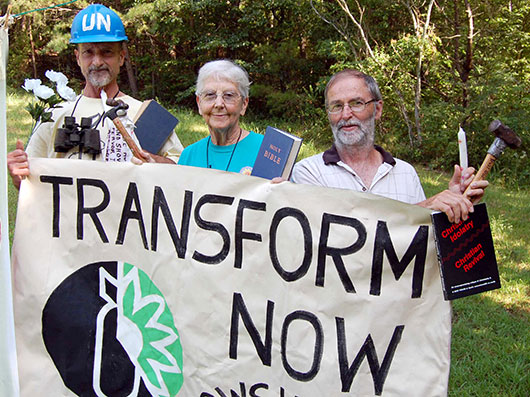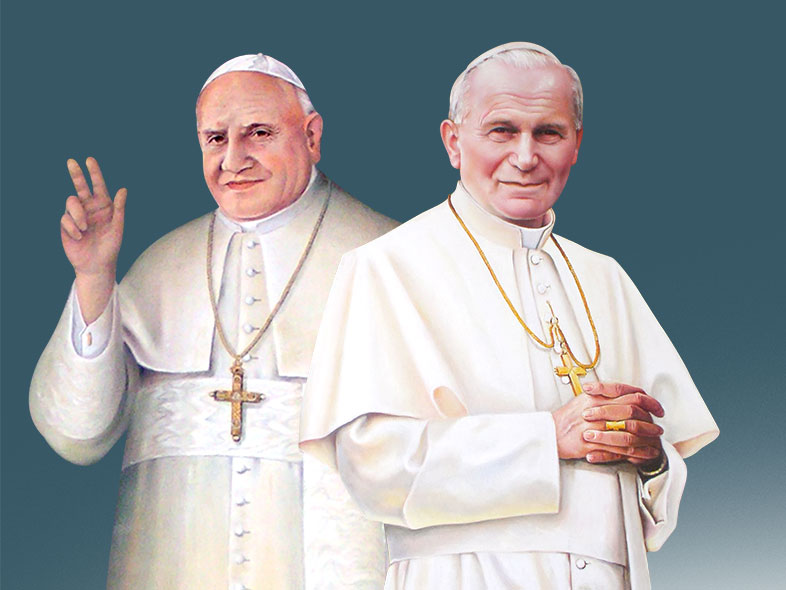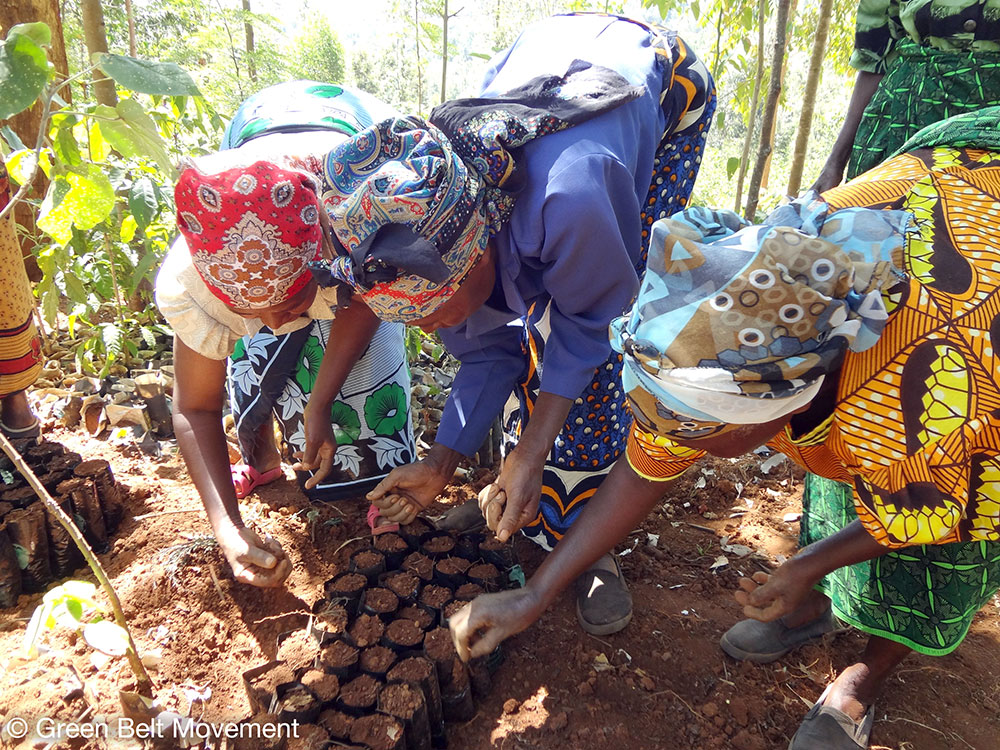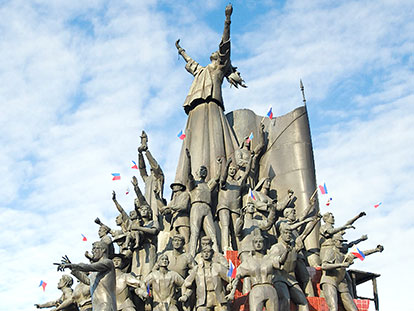Arakan Valley, in North Cotabato, in the island of Mindanao, is a place of immense beauty and natural wealth. Traversing fertile land from Cotabato to the boundaries of Bukidnon and Davao City, Arakan and its adjacent areas of sloping hills and steep mountains have contributed to making Mindanao the ‘Land of Promise’ for migrant settlers and wealth-seekers.
The Manobo tribesmen have lived since time immemorial in Arakan and its lush forests.
They worshiped Manama, their supreme deity. Their shamans had guardian spirits and offered rituals to the spirit world. Their warriors fought battles to defend their communities, that is why the Manobo honor their tradition of tribal struggles. Across this landscape are signposts to remind them of important events in the lives of their heroes. These events are incorporated in their epic “Ulahingan,” which continues to be chanted today, and which depicts a brave people resisting any attempt to dominate them.
But while the Manobos were fierce, harmony and mutuality were maintained in the tribe through customs and laws. The pre-colonial period allowed them to establish their sense of identity, vis-à-vis the neighboring tribes. When the colonization set in, however, the Manobos’ life-world drastically changed. In the 1950s, peasants began arriving in Arakan hoping to own a piece of land they could till. They sought ways to get the Manobos to allow them to take over small plots in exchange for sardines, cigarettes and other goods from the lowlands.
An increasing number of the Manobo started retreating to the hinterlands. But they soon found out that there were no more forests, and many were forced to live in peaceful co-existence with the settlers. As more Christian Ilonggo reached Arakan, religious congregations sent missionaries to minister to them. The first to reach Arakan belonged to the Oblates of Mary Immaculate. Then the members of the Pontifical Institute of Foreign Missions (PIME), coming from Italy, took charge of the pastoral needs of the area, in the midst of the tensions between tribal farmers, ranchers and miners.
You and I are one
In the morning of October 17, 2011, at about 7.30, Fr. Fausto Tentorio, an Italian missionary belonging to the PIME group and parish priest of the Catholic community of Arakan, was about to board his car to attend a meeting of the clergy in the capital city of Kidapawan, thirty kilometers away, when a lone assassin with a gun equipped with a silencer appeared out of the blue and shot him eight times. Fr. Fausto collapsed on the ground and the gunman, wearing a crush helmet, casually walked to a motorcycle waiting near the Mother of Perpetual Help Church compound and sped away with a companion.
“I rushed to where he was and I saw him on the ground, blood oozing from his body” Leonardo Reovoca, a former parish worker and now a councilor for Arakan testified. Fr. Tentorio, 59 years old, was declared dead at the hospital – the third Italian priest and the third member of the PIME who paid with his life the faithfulness to the people and to a mission threatened by contrasting interests and ridden with violence.
In what can be seen as a premonition of his premature death, Fr. Fausto had written down in his Last Will, in February 2004: “…If I were to die in Arakan, my body is to be laid into a coffin built with the wood of the mahogany tree which I have planted here in Arakan.” Then he added: “If it will be possible, on my grave, the following words are to be inscribed: ‘You have been told, O mortal, what is good, and what the Lord requires of you: Only to do justice and to love mercy, and to walk humbly with your God.” And in Cebuano language, he wrote: “Your dreams are my dreams, your struggles are my struggles; you and I are one as partners in building God’s Kingdom.” To those who remarked: “But you are not going to die yet, Father. You are still strong,” Fr. Fausto replied: “I won’t die of sickness. I’m going to die of bullets.”
Hippie priest
Fr.Fausto Tentorio was born on January 7, 1952 in St. Mary of Rovagnate, Lecco, Italy. He was ordained to the priesthood in 1977 and left for the Philippines the following year. He worked with Christian, Muslim and indigenous communities in Columbio, Sultan Kudarat, before transferring to the mission in Arakan in 1980.
Fr. Fausto, who came to be fondly called “Father Pops” by the indigenous people, when he arrived in the Philippines, struck an unusual figure with his sharp eyes, shoulder-length hair, and simple wardrobe: T-shirt, faded jeans, rubber slippers. He was a hippie Jesus look-alike. He was only 26 when he landed in the Philippines, a new type of missionary, who had gone through the 1968 students’ revolution and had found his identity in his vocation to the missions.
One was easily drawn to him. He was gentle, soft-spoken, unobtrusive, and insisted on staying in the background. He worked hard on the language and was very interested to know about the Philippines, particularly Mindanao; the people’s culture; the evils of martial rule; and the people’s resistance. At first meeting, one knew he was a progressive churchman with militant views on justice and the burning social issues of the day. But he was no rabble-rouser; he did not make radical speeches and fiery sermons. He listened intently to what people had to say and was very supportive of laypeople.
The land grab
At the time of his arrival in Arakan, the valley was seething with the Manobo’s frustration as the arable land in their control quickly dwindled. Life was not rosy either for most of the migrant settlers, although they were a little better off than the indigenous people. But businessmen from the lowlands and local government bureaucrats aligned with the Marcos dictatorship – all well-protected by the military – continued to find ways to grab more fertile land.
Fr. Fausto initially assisted his confreres in building and strengthening the Basic Christian Communities, but soon decided to work full-time for the Manobo as part of the Tribal Filipino Apostolate. He stayed in this apostolate for the rest of his life along with another confrere, Fr. Peter Geremia. Fr. Fausto decided to address the plight of the Manobos who, like many of the indigenous people in Mindanao, are the most neglected in terms of government services and even the ministrations of the churches.
He trained his staff in order to set up literacy classes, health centers, and farms and other livelihood projects to provide the Manobos with the skills they needed to improve their lives. Hundreds of Manobo families benefited from these projects. But the most pressing task was to stop the encroachment of outsiders on the remaining Manobo ancestral domain. Fr. Fausto and his staff realized that empowerment was imperative. Thus, the massive organizing work in all the Manobo settlements, which led to the birth of the Manobo Lumadnong Panaghiusa (MALUPA).
At risk of his life
Through the sheer force of unity and backed by the social capital of the Church, the Manobo struggled for self-determination. There were skirmishes with the military and its militia, but the indigenous people were somehow able to advance their interests. Fr. Fausto never took center stage in all these. With the Manobo empowered to take leadership, he took on the role of inspiring, supporting and affirming them.
But the PIME missionaries experienced harassment, and eventually two of them were shot dead for their commitment to the poor of Mindanao – Fr. Tullio Favali in Cotabato on April 11, 1985, and Fr. Salvatore Carzedda in Zamboanga on March 20, 1992. Fr. Fausto knew that he, too, was at risk.
In 2003, eight years before his death, Fr. Fausto had survived a threat of abduction by an anti-communist paramilitary group called “Baganis,” when he went to a remote village in Kataotao, Bukidnon. After two hours of riding on motorcycles and horses, he and his team arrived at Kabalantian where people told him that armed men were lying in wait for him a bit further on. Despite the threat, Fr. Tentorio and his people walked on foot to Sitio Malinao and again the people told him that the Bagani wanted to cut his head, roast his ears and eat them.
Fr. Fausto spent the night with them. They hid him in a small bamboo cabinet. In the morning the Baganis arrived but the people who had gathered to protect the priest were many and the paramilitary group did not insist in searching. Then people of another village invited the Baganis to their place to eat a pig that they had slaughtered. It was after the Baganis had gone to eat the pig, heeding the astute invitation of Fr. Fausto’s friends that he and his companions were able to leave their hiding place.
The Bagani tribal force is one of several paramilitary groups, composed of indigenous people, organized by the Army of the Philippines in order to fight the communist guerillas of NPA (New People’s Army). According to the common conviction, they are the same people who eventually caught up with Fr. Fausto and killed him. Two of them have recently been indicted but, as to this day, nobody has been tried and condemned for the murder of Fr. Fausto, confirming the impression of the atmosphere of impunity that prevails not only in Mindanao, but in the Philippines as a whole.
Fr. Fausto had made a clear choice. Like the Man from Nazareth whom he followed all the way to Arakan, he chose to be on the side of the most abandoned. He was fearless. Not once, not even in the worst of times, did he ever harbored fear in his heart. He lived simply in the company of the Manobos, at peace in the land that he loved. With his death, Fr. Fausto has become a martyr.
The funeral was a plebiscite
The extraordinary display of love of the Filipino people for Fr. Fausto Tentorio somewhat lightened the grief of his family members present during the final rites that celebrated his life of dedication to the poor and abandoned. The slain Italian missionary was escorted to his final resting place by an estimated ten thousand mourners, mostly Lumad (indigenous people) and peasants demanding justice for his killing.
Fr. Tentorio’s brother, Felice, and other family members, 88 priests and bishops, Italian Ambassador Luca Fornari, North Cotabato Governor Emmylou Mendoza, and Fr. Gian Battista Zanchi, the PIME superior general, attended the funeral Mass at Our Lady Mediatrix of All Graces Cathedral packed to capacity. The funeral procession wound its way for more than four kilometers to the compound of the Bishop’s Residence in Balindog, where Fr. Tentorio was buried in a tree-shaded lot next to Fr. Tulio Favali.
At the Mass, Ambassador Fornari, who had defied his own advisory banning Italian nationals from traveling to Mindanao, expressed indignation over Fr. Tentorio’s killing and the prevailing climate of impunity in the Philippines that, he said, allowed the murder of the missionary and indigenous peoples. He demanded that the government go after and punish Fr. Tentorio’s killers, saying: “Only then will the memory of Fr. Fausto be honored; only then can we continue to serve the indigenous peoples; only then can the quest for equality not be lost but shared with the generations to come.”
In a message read before the Mass, Zanchi also condemned Fr. Tentorio’s killing and called for justice. He said that the diocese was “now soaked with the blood of Fr. Fausto and Fr. Tullio.” Bishop Romulo dela Cruz of Arakan added: “Even when peace and justice will finally arrive in Arakan, their memory and martyrdom shall not be forgotten.” The archbishop of Cotabato, Orlando Quevedo, said that Fr. Tentorio was “a worthy member of the noble line of martyrs in the Church in Mindanao.”
Bishop Quevedo said that the missionary had “a soft, easy smile and a voice that invited conversation. The only enemies he could make are those who wanted to silence his voice appealing for justice and peace for the indigenous peoples and for God’s creation.” He added: “If the perpetrators think that his murder would silence priests, religious and bishops from proclaiming the justice of God’s kingdom, they are wrong. The blood of martyrs, like Fr. Fausto, fans the dare and courage of those who care about peace and justice enough to sacrifice themselves while traveling the road of active non-violence.”
Fr. Peter Geremia, Fr. Fausto’s confrere, spoke in these terms of his martyred colleague: “Fr. Pops represents the dreams of our people in the Arakan area, all over the diocese of Kidapawan, and all over Mindanao, whom we call the PDOMES-Poor-Deprived-Oppressed-Marginalized-Exploited-Struggling masses. The assassins tried to kill our dreams but they only added life to Pops. They expanded his presence and his influence. Now, he is a much larger figure and his death touched the heart of many more people.
“He used to be a low profile, shy type, avoiding publicity, allergic to interviews and statements, a very simple and active servant of the people, as a priest, as a friend, as a companion. He has now become a new sign of the times, the bearer of the dreams of many victims and of other dreamers who continue serving the people in their struggles.”








